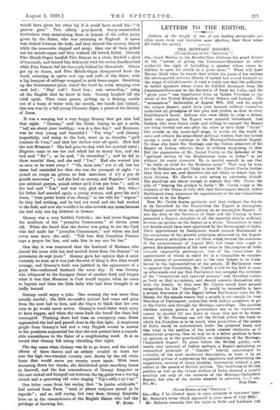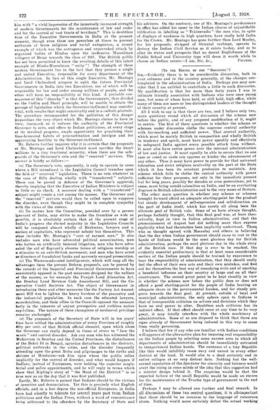[To THZ EDITOR or THL " SPEC/11'08.']
Sts,—May I be allowed space in your columns to comment upon Mr. Roberts's letter which appeared in your issue of July 20th? Mr. Roberts remarks that his visits to Delhi and Lucknow left him with " a vivid impression of the immensely increased strength of modern Governments for the maintenance of law and order and for the control of vast tracts of territory." This is doubtless true of the Executive Governments in India at the present moment, though even these are powerless at times to prevent outbursts of fierce religions and racial antagonism, a recent example of which was the outrageous and unprovoked attack by organized bodies of Hindus upon the inoffensive Mussulman villagers of Berar towards the close of 1917. The British public has not been permitted to know the revolting details of this latest example of Hindu-Mussulman " unity"! The strength of these modern Governments lies in the fact that they possess a single and united Executive, responsible for every department of the Administration. In lieu of this single Executive, Mr. Montagu and Lord Chelmsford propose to split the future Provincial Governments in India into two Executives, one of which will be responsible for law and order among millions of people, and the ether will have no responsibility of this kind. A probable con- sequence of this " diarchy " is that the Governments, thus divided on the Codlin and Short principle, will be unable to obtain the passage of legislation which the Governor-in-Council may consider vital, with results that might conceivably end in a culbute generale. The procedure recommended for the palliation of this danger jeopardizes the very object which Mr. Montagu claims to have in view, inasmuch as it reduces the authority of the Provincial Governor to zero, and offers to Indian politicians, at every stage of its involved progress, ample opportunity for practising their time-honoured habits of procrastination and intrigue and for aggravating hostility to the Governor-in-Council.
Mr. Roberts further inquires why it is certain that the proposals of Mr. Montagu and Lord Chelmsford must sacrifice the dumb millions to a tiny fractional minority, when there are the safe- guards of the Governor's veto and the " reserved " services. The answer is briefly as follows :-
(a) The Governor's veto, apparently, is only to operate in cases where a Bill introduced in the Legislative Council trenches upon the field of " reserved " legislation. There is no veto whatever in the case of Bills dealing wholly with " transferred " subjects. These can be passed in defiance of the Governor's approval, thereby implying that the Executive of Indian Ministers is subject to little or no check. A measure dealing with a " transferred " subject might create a riot among the masses. The Governor and the " reserved " services would then be called upon to suppress the disorder, even though they might be in complete sympathy with the views of the rioters.
(b) No matter how the Committee, presided over by a person ignorant of India, may strive to make the franchise as wide as possible, it is absolutely certain that at the present stage of India's progress the elected majority in the Legislative Councils will be composed almost wholly of Brahmins, lawyers and a section of capitalists, who represent nobody but themselves. This
g lass includes Mr. Montagu's "core of earnest men." It also includes men who have advocated political assassination, men who batten on artificially fostered litigation, men who have advo- sated the aid of flagrantly obscene forms of religious worship as a stimulus to an anti-British movement, and men who have acted as directors of fraudulent banks and narrowly escaped prosecution.
(c) The Western-educated intelligentsia, which will reap all the advantages from the present Reform proposals, can be proved by the records of the Imperial and Provincial Governments to have consistently opposed in the past measures designed for the welfare of the masses, as for example the Punjab Land Alienation Act. the Bombay Land Revenue Code Amendment Bill, and the Co- operative Credit Societies Aet. The object of Government in introducing those and other measures like the Factory Act Amend- ment Bill was to lighten the heavy burdens of the peasantry and the industrial population. In each case the educated lawyers, oacerdotalists, and their allies in the Councils opposed the measure hotly in the interests of unjust prerogative and ruthless native eapitalism. The nature of these champions of mediaeval privilege remains unchanged.
(d) The proposals of the Secretary of State will in ten years' time have robbed the administration of every Province of roughly fifty per cent. of that British official element, upon which alone the Governor can really depend in times of stress to " face the music" and control disorder. Ask any man who has witnessed the Muharram in Bombay and the United Provinces, the disturbances of the Bakri Id in Bengal, agrarian disturbances in the districts, political outbreaks in the cities, and the disorder frequently attending upon the great Melee and pilgrimages to the tirths and shrines of Hinduism—ask him upon whom the public relies implicitly for the control of disorder, and what would happen if Indians; instead of Europeans, were holding the superior magis- terial and police appointments, and he will reply in terms which show that Kipling's story of " the Head of the District " is as true now as on the day that it was first published.
Lastly, Mr. Roberts is pained that Indians should be the victims of invective and denunciation. Yet this is precisely what English officials, and in a less degree the non-official Europeans, in India have had silently to tolerate for several years past from Indian
politicians and the Indian Press, without a word of remonstrance being addressed to the offenders by the Secretary of State and his advisers. On the contrary, one of Mr. Montagu's predecessors in office has added his sneer to the Indian chorus of unjustifiable vilification in labelling as " Tchinovniks" the men who, in spite of displays of weakness in high quarters, have really held India for the Crown. Mr. Montagu has gone further than Lord Morley, for his proposals, stripped of Oriental verbiage, operate to destroy the Indian Civil Service as it exists to-day, and so to alter its status and prospects that no decent Englishman of the Public School and University type will deem it worth while to
choose an Indian career.—I am, Sir, &e., FAIIJDAR.



























 Previous page
Previous page